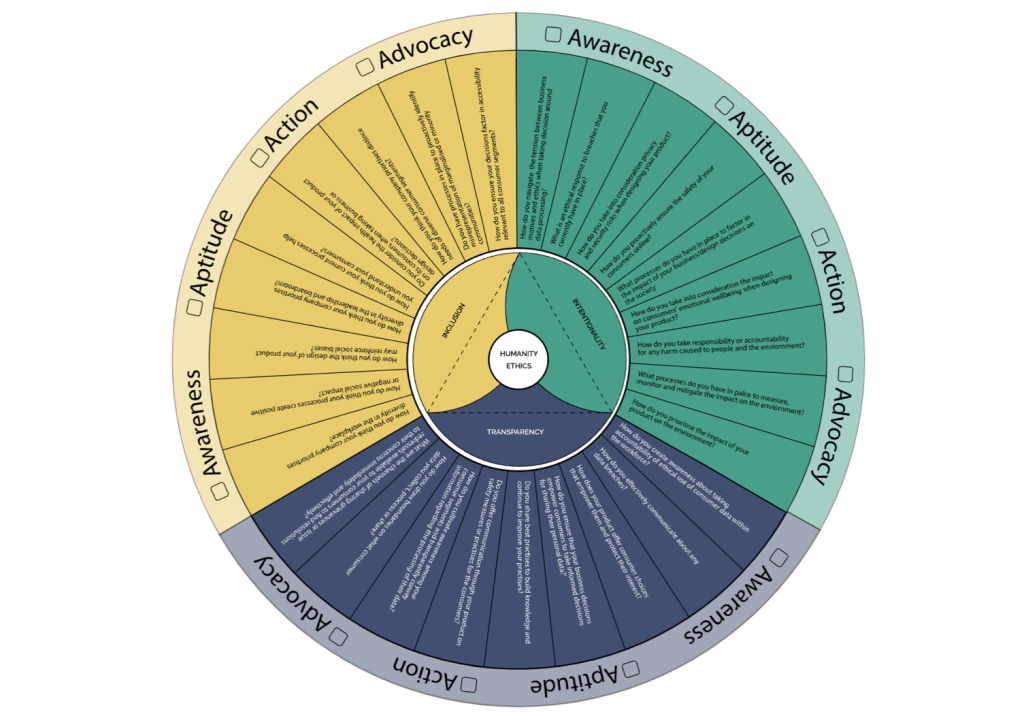As technology pervades our daily lives, the concept of social sustainability in tech has never been more critical. “Social Sustainability in Tech,” is a recent report launched through a collaborative effort by two Indian companies, Xeno Co-lab and Darjeeling Design Co. It offers a comprehensive framework to address the pressing issues of ethics, values, and human-centric design in the tech industry.
Understanding Social Sustainability in Tech
Social sustainability in tech ensures that technological advancements do not compromise the well-being of communities and individuals. It requires a balanced approach that incorporates ethical considerations, inclusivity, and long-term societal impact. The report emphasizes that technology’s benefits should be measured not only by innovation and progress but also by positive social impact on people, society and the environment. This concept involves designing technology that supports societal progress without leaving anyone behind. Key concerns include data privacy, digital accessibility, and equitable representation in tech development. The report highlights the need to move beyond viewing technology solely as a driver of efficiency and profit, recognizing it as a tool that can shape the social fabric of our communities.
One core issue is the widening digital divide and increasing social discrimination linked to technological advancements. The most recent example of that was seen with the AI facial recognition technology failing to recognise dark-tones faces and therefore perpetuating discriminatory patterns that our society has tried to fight against for generations. As technology evolves, it must benefit all segments of society equitably. The report underscores the importance of inclusive design practices to address diverse community needs, ensuring accessibility regardless of socio-economic status, geographic location, or digital literacy. Closing the digital divide is crucial for achieving social sustainability. This involves advocating for policies and practices that promote digital inclusion, such as affordable internet access, digital education programs, and support for underserved communities.
The report advocates for a human-centric perspective on technology, prioritizing human values and ethics. This approach involves rigorous ethical standards in AI development and implementation, addressing biases in AI algorithms to prevent discrimination and unfair treatment. That includes transparency and accountability in the tech industry, particularly concerning the storage and transmission of sensitive personal data that leads to informed decision making by all users. Ethical considerations must be integrated at every stage of technology design, including thorough impact assessments, diverse stakeholder involvement, and continuous monitoring of societal effects.
By prioritizing these values, technology companies can create a more inclusive and equitable digital landscape while minimizing unintended consequences.
Key Principles for Achieving Social Sustainability
The report outlines three key principles essential for achieving social sustainability in tech:
- Inclusion: Ensuring that technology design and implementation reflect the diversity of society. This involves incorporating diverse perspectives in leadership and workforce to create solutions that resonate with all community segments.
- Transparency: Promoting transparency in data processing, privacy policies, and corporate practices. By being open about how data is stored, used and protected, companies can build trust and accountability with their users.
- Intentionality: Making deliberate and ethical decisions that align with societal values. This principle calls for reimagining business processes and goals to prioritize customer well-being and social good along with monetary goals.
The SST Reflection Wheel

The SST Reflection Wheel is a tool designed to help companies assess their current practices and identify areas for improvement. By reflecting on their processes and aligning them with the principles of inclusion, transparency, and intentionality, companies can create a roadmap for achieving social sustainability.
The SST Reflection Wheel is structured around a set of probing questions that encourage companies to evaluate their impact on people, products, and processes. This self-assessment tool guides organizations in understanding their current state and helps them develop strategies to enhance their social sustainability efforts. The wheel covers questions across people, products and processes within a company to evaluate the efforts at all fronts at varying degree of maturity across the 4As-Awareness, Aptitude, Action and Advocacy. With this, leaders can start to reflect and probe discussions within companies on where they stand today and where they would like to go in the future.
Looking Ahead as Design Leaders
Design leaders are uniquely positioned to bridge the gap between technology and its users. Their role involves understanding user needs, behaviors, and pain points, and translating these insights into design solutions that are not only functional but developed with a deep understanding of their social implications and potential impact on different user groups.
This involves not only designing user-centric products but also influencing organizational values and practices. Designers can advocate for policies that prioritize social good, work to eliminate biases in technology, and promote practices that enhance social sustainability through the work they do. Their efforts ensure that technological advances do not come at the expense of social equity.
As technology continues to evolve, the importance of social sustainability in tech will only grow. The hope with this report is that it serves as a crucial guide for designers, developers, and business leaders who are committed to creating a fair and inclusive technological future.
About the authors
You can catch the founders, Nikhita Ghugari (co-founder of Xeno Co-lab) and Payal Chakraborty (founder of Darjeeling Design Co.) at the Design Matters conference in October 2024. Their talk is going to be a deep dive into the same report. You can read the report here: socialsustainabilityintech.com
Xeno Co-lab is a research & service design consultancy based in India that works with global clients across domains like healthcare, fin-tech and digital services to create experiences that are grounded in consumer insights.
Darjeeling Design Co. is an interdisciplinary strategic design consultancy based in India catering to clients globally. With expertise in technology and creativity, the firm excels in providing human-centered transformations tailored to the distinctive needs of its clients’ businesses and brands.
Nikhita Ghugari from Xeno Co-Lab and Payal Chakraborty from Darjeeling Design Co will give a talk about this topic at Design Matters 24, taking place in Copenhagen & Online on October 23-24-25, 2024. Get your ticket here.










